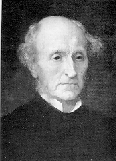

 Mill, John Stuart
Mill, John Stuart
Throughout the last half of the nineteenth century, during almost the whole of the Victorian ageright up
to the publication of Marshall's Principles (1890), the Principles of Political Economy, With Some of
Their Applications to Social Philosophy (1848) by John Stuart Mill was the leading economic textbook
of the English-speaking world. It drew its enormous appeal from its extensive coverage of contemporary
economic issues, from its judicious blending of economic analysis and historical illustrations, from its
masterful synthesis of Ricardian doctrine with many of the qualifications introduced by Rechart's critics,
from its radical tone contained within an orthodox framework, from its elegant style, and from the
reputation of Mill as a logician, philosopher, political theorist and belle lettrist. Here was no mere
economist but a leading Benthamite,4 saint of liberalism', and a figure that towered over the intellectuals
of his time in almost every area of debate.
....
© Mark Blaug, Great Economists Before Keynes: An Introduction
to the Lives and Works of One Hundread Great Economists of the Past
, Brighton: Wheatsheaf, 1986. In Stauffer Library: HB76 .B62
1986t
 Mill, John Stuart
Mill, John Stuart

 Mill, John Stuart
Mill, John Stuart